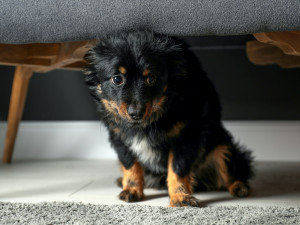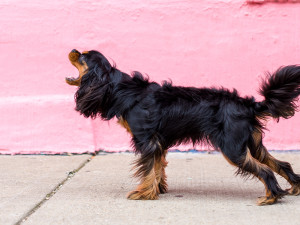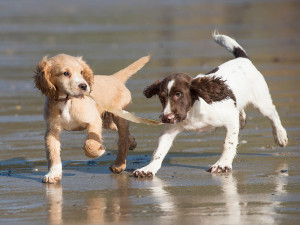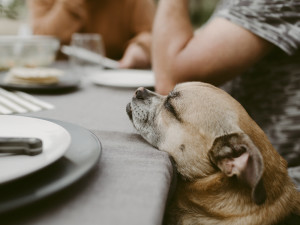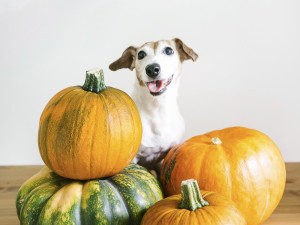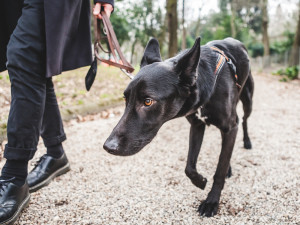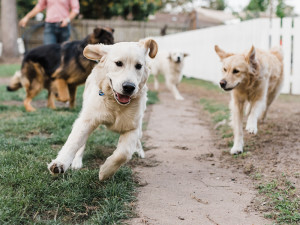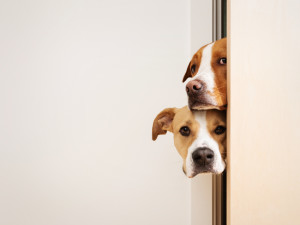Be My Guest: Training Your Dog in Social Graces
Because nobody wants your pup eating the host’s charcuterie platter.
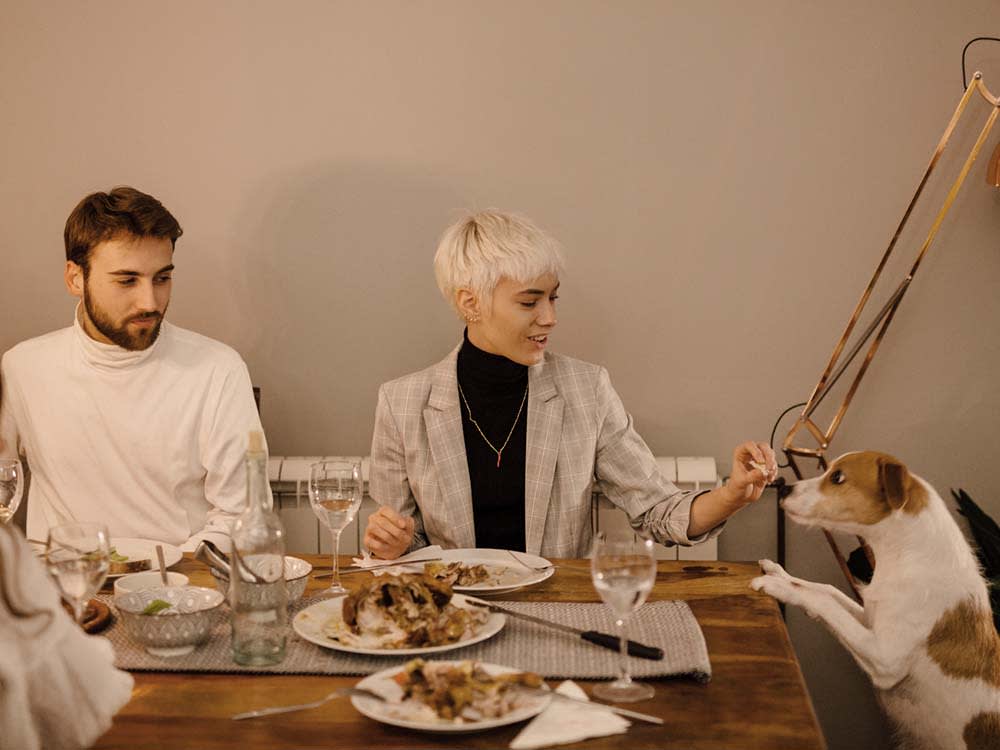
share article

Your pet wants you to read our newsletter. (Then give them a treat.)
Shortly after we were married, my husband and I spent the holidays with my in-laws, and we brought our young dog, Bugsy. He was social, had an excellent “stay,” came when called, had no history of food thievery, and wouldn’t dream of lifting his leg indoors (even on a tree), so my confidence in his visiting skills was high.
On arrival, as he occupied himself with a stuffed Kongopens in a new tab so we could unpack the car, a possible problem occurred to me. Bugsy often tossed his Kong into the air and ate any treats that flew out of it. In our poor students’ apartment, it was endearing, entertaining behavior. But my in-laws’ decor included crystal, collectible figurines, and an array of china teacups. Racing into the house in a panic, I caught the Kong in midair as it flew toward a set of porcelain miniatures. As I breathed a sigh of relief, it occurred to me that perhaps I had been a bit smug in thinking the trip would be stress-free.
This time of year generates tales of woe associated with bringing dogs to visit friends and relatives — whether your pup howls because they don’t have a seat at the dinner table or they get the zoomiesopens in a new tab at your in-laws’ tiny apartment. Whether or not people fully anticipate the trouble that awaits them, taking a dog into someone else’s home for the holidays can cause major stress. The best approach for assuaging this seasonal angst is two-pronged: Prepare your dog as much as you can ahead of time with the skills they’ll need to succeed during the visit, and make every effort to avoid other situations for which they haven’t prepared.
First, get permission to bring your pet
The preliminary step, of course, is to request permission to bring your pet along. Not everyone wants your pup to visit, no matter how well-mannered they are. Even dog lovers appreciate the advance warning that allows them to, for example, put away the fragile vase on display at the precise height of the perpetually swinging tail of your cheerful Great Dane. If your dog is not welcome, don’t bring them, or find somewhere else to stay. The strain of a visit with an unwelcome dog can permanently damage relationships. Plus, it’s hard on the dog to be "Undesirable Number One" in an otherwise festive home.
Brush up on basic commands (and fun tricks)
Training is a critical aspect of preparation:. The better trained your dog is, the more welcome you will both be as guests. The key skills are to be able to sit, stay, come, leave it, greet politely, and stop barking on cueopens in a new tab. It sounds like a long list, but these are also the basics of polite canine citizenship. I also recommend that you teach your dog at least one “show-off” behavior. This can be waiting at the door until told to proceed (easy to teach but impressive to most people) or a trick such as “roll over” or “high five.” Anything that makes your dog more charming will help ease tensions in case of a social gaffe. For example, I had a client whose dog jumped up on her father-in-law, but was forgiven immediately when she gave the cue, “you goofed,” and the dog responded by lying down and covering his face with his paws, as though in embarrassment.
Nip bad behavior in the bud
Common host complaints include barking, jumping up on visitorsopens in a new tab, and stealing foodopens in a new tab. Of course, if your pup is prone to more serious transgressions such as bitingopens in a new tab, destructive chewing, or house-soiling, it is unfair to expect your dog and your hosts to co-exist peacefully, and it may be best not to go a-visiting with them in tow.
Teach your dog the skills they’ll need to be a gracious guest. If your pup is a barker, teach them to stop on cue. Say “enough” the instant they start to bark, and then put treatsopens in a new tab right by their nose. Do not let them have the treats until they stop barking. Many dogs quickly learn that quieting down when you say “enough” is a way to get treats. If your pup jumps up on people, teach them that if they do this, the humans will leave. But if they sit, they will get treats and attention. Since the majority of jumpers do so out of an urge to be social, they quickly learn that jumping up makes people go away. They choose to sit instead, which results in the opportunity to socialize, and results in treats as well.
Bring toys and treats to keep them entertained
Even if you prepare ahead of time, there’s plenty to do during your visit to make sure that the holiday is remembered as a fun one rather than as the last family holiday to which you were allowed to bring your dog. Exerciseopens in a new tab, chews, interactive toys, and puzzlesopens in a new tab can minimize behavioral issues such as destructive chewingopens in a new tab and counter-surfing, which tend to worsen when dogs are bored or full of pent-up energy. Bring a crateopens in a new tab if your dog likes it and your hosts have enough space. Help clean up, especially if the mess involves dog hair or sloppy drinking at the water bowl. Seize the opportunity to put leftovers out of your dog’s reach, and volunteer to take out the trash.
Run through a training drill on arrival
As soon as possible after you arrive, practice the skills your dog already knows so that they can learn to do them in new places, too. One of the things that separates professional trainers from novices is that professionals know that training doesn’t automatically transfer to new locations. For example, just because your dog has a rock-solid stay in your living room, doesn’t mean they know how to respond in the same way in your yard, at the park, or at Grandma’s house. Even a couple of five-minute training sessions can significantly improve your dog’s performance and manners.
Obedience skills aren’t the only ones that may drop off at a guest’s house: Many dogs who are completely trustworthy when left at home alone are stressed, scared, or mischievous when left alone in a new place, all of which can result in house-soiling or the aforementioned destructive chewing or counter-surfing. The change in routine, a new place and additional people may also make dogs more likely to exhibit these unwanted behaviors. Adjust your plans — and expectations — accordingly.
Set your dog up for success
Pup faux pas may occur, but focusing on prevention will help your dog succeed. Don’t set up your highly food-motivated dog to fail by leaving them alone, even for a minute, while the turkey is on the table. If you know your dog has a tendency to find food or shoes, don’t put temptation in their way. Make some areas of the house off limits, or use a crate, baby gate, or puppy penopens in a new tab so that your dog never gets the opportunity to display anything but their best behavior.
No matter how things go, send a thank you note to your hosts to express your gratitude that you and your dog were welcomed into their home (and, if necessary, to apologize). With thoughtful preparation, you can prevent a major pup holiday meltdown.

Karen B. London, PhD, CAAB, CPDT-KA
Karen B. London, Ph.D., is a Certified Applied Animal Behaviorist and Certified Professional Dog Trainer who specializes in working with dogs with serious behavioral issues, including aggression, and has also trained other animals including cats, birds, snakes, and insects. She writes the animal column for the Arizona Daily Sun and is an Adjunct Professor in the Department of Biological Sciences at Northern Arizona University. She is the author of six books about training and behavior, including her most recent, Treat Everyone Like a Dog: How a Dog Trainer’s World View Can Improve Your Lifeopens in a new tab.
Related articles
![A dog resting its face on a dinner table.]() opens in a new tab
opens in a new tabAin’t Too Proud to Beg
5 tips for keeping your dog out of trouble on Thanksgiving.
- opens in a new tab
Can Dogs Eat Pumpkin?
Yep! The superfood is a delicious natural remedy for diarrhea and constipation.
![Shy black dog walking with owner at the park.]() opens in a new tab
opens in a new tabHow to Help an Anxious Dog Conquer Their Fears
Six animal behaviorists and I share our pro tips for boosting the confidence of a fearful dog.
![Pet parent comforting anxious dog by holding their paw]() opens in a new tab
opens in a new tab8 Tips for Helping an Anxious Dog
Easy ways to calm your pup’s nerves.
![Four dogs running around in an enclosed outside area]() opens in a new tab
opens in a new tabShould You Send Your Pup to Dog Daycare?
Doggy daycare is more than just fun and games.
![Two fearful adolescent dogs peeking through a slightly open door]() opens in a new tab
opens in a new tabPuppy Fear Periods: Why is My Dog Scared All of a Sudden?
Turns out, adolescence isn’t just tough for humans—it can be hard on dogs, too.
